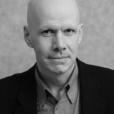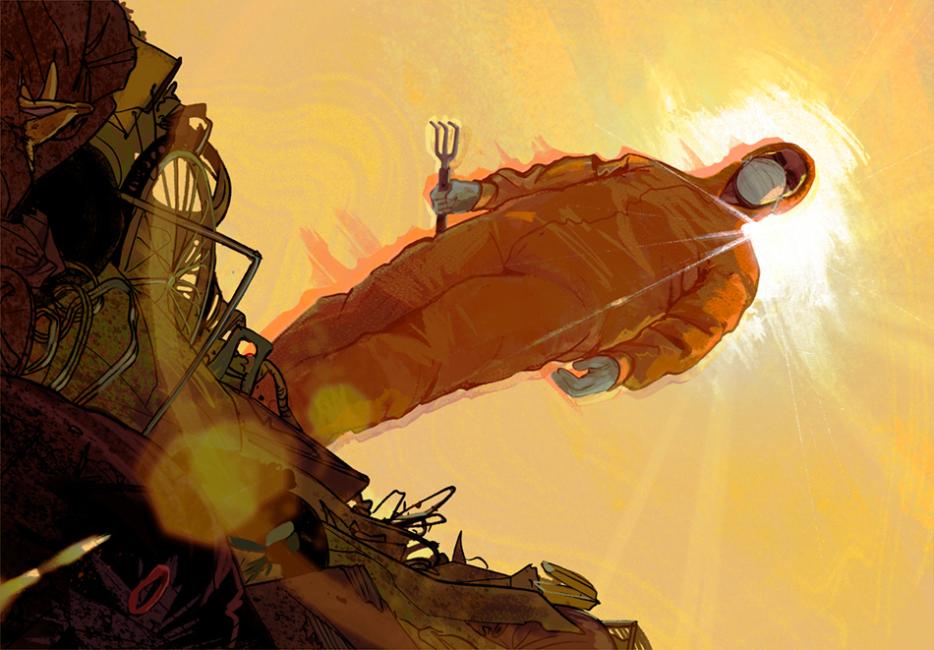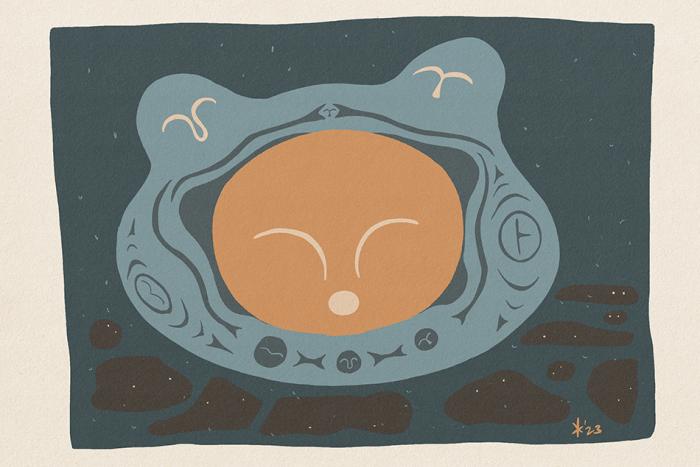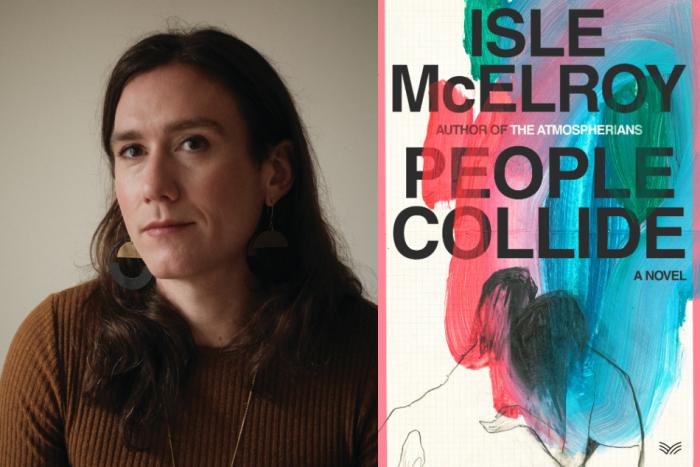This part of the landfill was the highest point for a hundred miles, we tell ourselves, as we pause to look west to a place where even flat-assed Saskatchewan could come up with another hill that outdid us. I look back, to the volunteers and below them, past the news van and trailers to a small gathering of protesters near the highway. I turn back to the horizon.
A few of us from the City Parks Department gather on the northwest ridge, getting ready to go to work. We are in our area and the volunteers are in theirs. Around us are a number of small wooden stakes, each topped with a stapled-on ribbon of orange reflective material, the sort of thing you’d see used in land surveying. The stakes cordon areas off, declaring our territory and its limits. The size of sixteen tennis courts. Two-thirds of a soccer field. We started off the week searching as one big group, but Curtis and one of the student volunteers had what a representative from our department called a “spirited exchange” and now we each had our own areas.
None of us wanted to be here, but we were told that the city had to make some sort of offer of manpower, a gesture, and the police were out of the question, so City Parks was tapped to provide personnel. We were seen as neutrals. No one hates the guy that keeps the wading pool clean. But no one asked us our opinion about working on a mountain of trash.
It wasn’t like we could have filed a grievance. We’re actually outside of city limits and so it isn’t even our jurisdiction. As if jurisdiction matters. “We should have filed a grievance, anyway,” Curtis mused out loud as we shared a bench seat on that first day’s ride out to the site. I just nodded and imagined that the school bus we were riding in, travelling over gravel roads and carrying sullen adult passengers, must have given off the feel of ferrying convict labour. The city’s task force and the mayor’s office did have a meeting with our union reps—closed door, next year’s contract negotiations looming like a winter weather system—and suddenly we were briefed and on the bus and then the hill. We were told what to do, how to do it and to not talk to anybody about what we were doing. We deposited our phones into the Ziploc bags provided at the site entrance trailer at start of shift and they were returned to us at end of shift. Nothing about the job was good, except the time and a half. Time and a half was good enough to stop talk about a grievance.
On this morning, at this place, the prevailing wind is from the west. Given the location of the site, the air we breathe right now will reach the city in an hour or two. When it arrives in the city it will seem like a mystery, an affliction. But the same wind that brings a sense of this place to the city will also carry it away, and any awareness that something out of the ordinary has occurred will be momentary. And forgotten.
On our first day, after our briefing and suiting up, we were all issued cultivators: garden tools from the local Canadian Tire with long wooden handles that, instead of a rake or a hoe at the end, have three curved prongs. We’ve been told to use the cultivators to turn over material. We’ve been asked to be gentle and diligent with these giant, pronged implements.
It was the beginning of our second week on the site, and I was still getting used to the job, which really meant getting used to how hot it was in the disposable coveralls and the masks we had to wear. The hooded white plastic suits meant everyone on the hill—the City Parks crew and all the volunteers—looked identical. And although the masks weren’t much good at keeping out the stink of the site, they did muffle our voices, which made me wonder how Curtis could have gotten into an argument with one of the volunteers. When I had pulled them apart, Curtis said the guy was going on to the girl beside him about geology.
“And this upset you?” asked a city supervisor later that day at a debriefing in an on-site trailer that served as our changing room. After calling the union and being told to have somebody there as a witness, Curtis chose me to come along.
“It was the way he said it,” Curtis replied.
“How did he say it?”
“It wasn’t a conversation, you know, it was ‘for us to hear.’” He looked over at me and I sat perfectly still. It was cool in the trailer. Air-conditioned. It was the end of the day, but they still hadn’t allowed me my phone back yet.
The supervisor nodded and narrowed his eyes. He was a man who looked to be in his sixties and who I understood had been dispatched that afternoon to the site. He seemed intent on maintaining his composure in a way that would be familiar if you’ve seen certain parental-child interactions.
“What did he say, exactly?”
Curtis sighed, eased into a shrug and looked at the ceiling, all in one gesture so fluid it seemed like a yoga move.
The supervisor turned toward me. His eyes moved down to my City Parks Department photo ID hanging from its lanyard around my neck and then back up to my face. Apparently, I checked out.
“Did you hear what was said?”
I shook my head no. Curtis told me that the kid was mouthing off, talking about how the retreating glaciers ground down whatever mountains were here, pulverized them into the bed of an ancient sea. What made Curtis furious, he said, was when the kid said: “All landscapes are inevitable.”
I didn’t relay any of that to the supervisor because he didn’t ask what Curtis said the kid said. He asked what I heard. I heard nothing. I said as much.
The supervisor drove off to the city. The next morning, we returned to a segregated, staked out site. There had been an apology from the city to the organizer of the volunteers, invoking the heat and stress of the situation and asking for understanding and cooperation during these difficult times.
What we were standing on wasn’t really a hill anyway. It was just accumulation, the layer-upon-layer of what we threw away, of what we were. It was a hill in the way an improperly installed carpet folds a little and grime builds on the ridge, making it just marginally higher than what it was before and then, with the passage of time, there is enough dirt that it becomes something more than a ridge. Eventually, especially out here, it becomes distinct enough and disrupts the horizon and then you can call it what you want. A feature. Relief. Some people call it a hill.
It's still early but the sun is already pretty ambitious. I feel the weight of it on my shoulders like a backpack that doesn’t hold anything I’ve chosen to carry. It doesn’t take long for us to finish searching a designated section of the northwest corner, far enough from the entry point to the site that we’d lost sight of the people gathered there. I took a break from scouring the small area at my feet, and looked back across the landfill, expecting to see the limits of the site disappear like the edges of a tabletop. Instead, the terrain around us rose gently in all directions, making it seem as though we were standing at the lowest point of a shallow bowl. This made where we stood seem fake, constructed like a movie soundstage where we had been costumed and lined up for choreography that no one had fully explained to us.
We advance to the ridge of the bowl. There, the landfill drops away to reveal another ridge below us and a view of the Assiniboine Valley and I think about what the student said to Curtis. I understand what he said, but looking out at it, it’s hard to believe that there were ever real hills here, that it was ever anything other than a table-flat flood plain, a maker of once-a-century floods that somehow arrive every decade.
There are moments when the light seems to flicker at the edges of what I see. It starts midmorning. Maybe because that’s the time I become dehydrated. At first it seems like a light, blinking, a reflection of glass or sunlight catching a metal edge. One time I looked and I swear I caught sight of a shadow, and wondered if what seemed to be a reflected light was really just the passing of that shadow, the sun strobing against a gull’s wings a hundred feet above me. This starts now, the flickering, and I look up to a sky emptied of clouds or birds. We cast the only shadow here.
*
We had no water delivery this morning, and Curtis, who’s become the unelected leader of the group, declared that we would start our day anyway. I always carry extra water with me because of the methadone, and Curtis knows this and I know it’s not a decision he made to make me suffer as much as him just thinking about whether he’s thirsty or not. But by eleven I’m not feeling well, sweating in the hazmat suit and feeling choked by the mask. There is a continuous rippling around me, no matter where I look. Staring up into the bleached summer sky with its laser pointer heart is enough to tell me it’s not a flock of circling shit-hawks. This is just me.
This is me.
The line moves like a large animal, sidewinding over the terrain. I see my place in line, where I must have stood minutes before, now as empty space, as a gap that has turned a single line into two. Curtis is standing next to the gap, the tail of one of the twin snakes. You’d think anyone would notice that the person who was beside them has gone missing, but Curtis is resolute, scanning the ground, probing it with his cultivator like he’s tending something more than another precious hour of time and a half. He never once lifts his head or turns back. I am invisible.
I have to stop. I lean on my cultivator for support, like some old biblical character with his staff. I watch my tribe abandon me, step by measured step.
I supported Curtis when he had to speak with the city supervisor. I went along, anyway. I didn’t contradict anything he said. That should be enough. I suppose I could have told the supervisor that I heard the kid say something that provoked Curtis. But being there should be supportive enough for anyone. I’m not going to lie.
*
The doctor at rehab warned me to keep well hydrated when we were reviewing discharge medications. “Dr. Sunita”—like all the others, she wore an ID badge with only her first name on it—explained to me that methadone would cause me to sweat more and that it was easy to underestimate the amount of water a person could lose by sweating. I could pass out. I remember watching her tiny hands as she signed my discharge prescription, experiencing that moment of sudden focus specific to anyone who is dividing narcotic doses by days and then subtracting that number from the days to the next clinic visit. I was good, I thought with a relief that felt like a drug itself, and with this calculation made, I suppose I relaxed enough to forget her warning about the excessive sweating I’d have with methadone, which seemed pretty trivial back in February.
But here, staggering through the garbage, I am sweating in a way I have never experienced, in a way I never thought possible. I am my own weather system awaiting landfall. In contrast to a body that’s shedding water like a roof in a rainstorm, my newly upholstered mouth makes any word, any sound, begin with a stuttering cough. My limbs hang, pulled by the gravity of a far larger planet. Turn around, Curtis. Fucker. I trusted you with this. You know I need water. I told you everything. At the start of every working day since I’ve come back Curtis has been the one I’ve asked to keep my Narcan pen, even though he told me he’d lost two nasal sprays. That’s trust. Fuck me. Did he lose the pen too? Curtis walks on. Is this payback for me not making up some story about the college kid?
I hear Dr. Sunita behind me, talking calmly about what heat stroke feels like, what I could expect. I imagine her hands, fluttering at her sides. For some reason my image of Dr. Sunita at this moment has the voice of my sister Debbie—all of this has the seamless internal logic of a dream—now telling me as I wake up in the Addictions Unit that Lori and the girls have asked me not to come home. Debbie, voice and image now fused, wants to know if I OD’d on purpose. I tell Debbie I don’t know. All landscapes are inevitable.
Under the sun that now feels like it has franchised the entire sky, I see another long winding chain, a line of volunteers detached from the main search party. They have noted my absence and are now looking for me, signs of me, evidence of my life under layers of circumstance from which a plausible explanation of me can be made: The repeated procurement of fentanyl like a crazed heist movie. The walk-in visits targeting the harried rookie doc at the end of the day when a script seems like such a minor compromise, such a small price to close the office and just go home. Relief is what we all want, after all. But even if no one asks, I can follow my trajectory even further back, all the way to its seemingly harmless start, each misstep and stumble along the way presented with a documentary clarity that startles me: This is me on a barstool, meeting a guy’s cousin who’s promised something stronger. There I am receiving the bloodless verdict of a workers’ comp tribunal. That’s me leaving the hospital after back surgery, my right hand holding a generous send-off prescription of oxycodone scrawled out by the ortho resident and passed to me so matter-of-factly that I could not imagine the future doom it carried. This is a chain, a sequence of events that brought me here. I could be found if someone searched.
I want to shout at Curtis, to tell him that I’m here, but no words come to my mouth. I feel light-headed enough that dropping to one knee seems not only the right thing to do but inevitable. I drop the cultivator I’ve been holding and almost fall over. My chest hits my bent knee and I hear a small gust of air leave my body. I want to die. I try to summon some form of thought, but all I can feel is hate, hate for what I’ve lost and for Curtis and the rest of them walking away, leaving me here until the layers continue to form, to cover me. I will disappear. I don’t want to die.
It’s then—as I’m trying to pick out the silhouette of Curtis from an ever-retreating line of look-alikes, trying to fix him with a dizzying hatred that seems like the only functioning emotion in me—that I see it right before me. I’m barely able to keep from passing out and yet it’s there. Evident. Obvious. I am on my knees when I see it. How did people not see this? How did they pass over it and think it was nothing? I look at it for a moment, at the utter beauty and sadness of the object. I touch it: long and smooth, slim and sculptural. Bleached. At this moment, I am unaware of exactly what this object is, but its image will end up haunting me. I will be compelled, tugged by a familiar, dogged need that will, to my amazement, lead me through the doors and into the reference section of the Centennial Library. It is here I will locate an anatomy textbook whose pages I will scour until I finally come across the image again. I will hover over this image as I did the object itself and will know it was real. I will understand I was holding a bone of the human forearm, of a human’s forearm. An ulna.
I grip the found object with my right hand. I lift my left hand and grunt, that’s the only word for it, a loud guttural plea because I have no words.
Several people in the line turn in my direction as I finally fall to the ground, my right hand clenched into a fist. My vision dims and blackens and then, after being on the ground for a second or two, the sky returns, immense and taut and interrupted by the masked faces of the other searchers who must have seen me fall and who are now looming over me. Dr. Sunita was right. The gathered crowd is pushed aside by Curtis, who crouches beside me. Curtis will get me water. We can all go home now.
“Get back,” Curtis booms. “I know him, he’s on methadone. He’s OD’ing.”
No. I writhe and shake my head from side to side wildly—a huge, boated bass of protest—and try to explain that this is all a mistake, but I am dry-choked and in place of words, a terrible baritone croak erupts from somewhere in my chest and bystanders who were kneeling attentively at my side now lean back in startled awe, their stories of the day crystalized, certain they are witnessing the birth of a terrifying beast. My vision collapses to a single point of what I think is light and then the sky appears again, static. Water.
Curtis towers over me. He puts his hand on my chest. I can feel this like a thousand atmospheres condensing on me, burying me. No, no. I lift my right hand in protest, now aware that it no longer holds anything, astonished, once again, at my ability to lose something I was determined not to relinquish. Curtis brushes aside my empty, groping hand like the hero he is, like the goddamn hero they all want to be and I swear I can sense the shaking of heads and the murmured chorus of judgment: addicts, man. He brandishes the Narcan pen above his head like a ceremonial object, like it’s a light sabre, flips the cap off with his thumb and pauses before driving the injector deep into my thigh.






